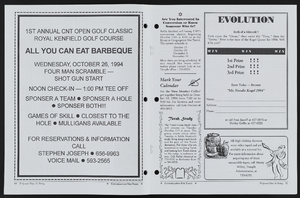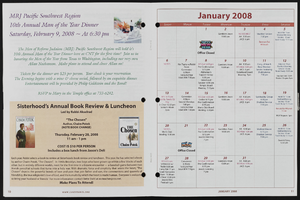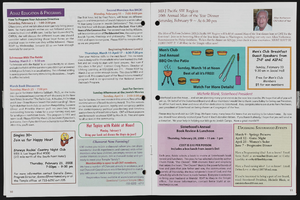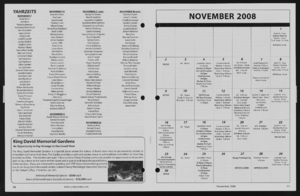Search the Special Collections and Archives Portal
Search Results
Barbara Raben Collection on the Las Vegas Jewish Community
Identifier
Abstract
The Barbara Raben Collection on the Las Vegas Jewish Community (1976-2018) is comprised of materials collected by Barbara Raben that document her personal life and her involvement with the Las Vegas, Nevada Jewish community, specifically the Hadassah Southern Nevada Chapter and the Jewish Family Service Agency (JFSA) of Clark County, Nevada. Hadassah and JFSA records consist of photographs and programs from events held by the organizations. Materials also document Raben's business, The Candy Factory, and her connections to the Florence Melton School of Adult Jewish Learning.
Archival Collection

Alan Stock oral history interview: transcript
Date
Archival Collection
Description
Oral history interview with Alan Stock conducted by Barbara Tabach on December 27, 2017 for the Remembering 1 October Oral History Project. In this interview, Alan Stock discusses moving to Las Vegas, Nevada in 1999 for his job as a radio talk show host for KXNT. Stock describes the broadcast that covered the October 1, 2017 Las Vegas mass shooting from 11 PM on that night until 9 AM the next morning. He talks about some of the calls the station received from various members of the community, including survivors of the shooting, families of those at the event, people on lockdown in the nearby hotels, doctors, and general listeners. Stock describes some of the topics discussed on the broadcast, such as what was currently happening on the Las Vegas Strip, stories of the aftermath, and the support needed from the general public. Other topics include gun control and conspiracy theories. He discusses the impact this and other shootings would have on public affairs, including tighter security in daily living and public gatherings. He compares security in the United States to security in Israel and other countries, focusing on the idea of unconcealed guns worn in public. Throughout this interview, Alan Stock explains that the radio station's goal was to provide accurate information to the public during the aftermath of the October 1, 2017 mass shooting.
Text
National Organization for Women, Las Vegas Chapter Records
Identifier
Abstract
The National Organization for Women, Las Vegas Chapter Records document the philosophy, activities, and politics of the National Organization for Women (NOW) from 1966 to 2009 with most materials covering the period of 1971 to 1974. The records demonstrate the activities and political positions of NOW and they include correspondence, policies, memoranda, files, publications, and ephemera from the Las Vegas, Nevada chapter.
Archival Collection

Transcript of interview with Charles W. Hunsberger by Stefani Evans and Claytee White, July 27, 2016
Date
Archival Collection
Description
It seems counterintuitive that a man who was raised a Mennonite, spoke Pennsylvania Dutch before he spoke English, and was destined to quit school after eighth grade to work on the family farm would grow up to become one of the most progressive and visionary library directors in the United States. His participation in the Building Las Vegas project results from his being responsible for building twenty libraries in Clark County during his 1971–1994 tenure as director of the Las Vegas-Clark County Library District. One of his first controversies was to insist on going to high school after his father demanded he quit. After graduating high school he went to Nigeria on behalf of his church, serving there for five years. Upon returning to the U.S., he found work at the Fort Wayne Library, albeit he was limited by how far he could advance because of his limited education. After attaining his library degree Indiana University at Bloomington he served as director at the Columbia City Library
Text

Steve Jones and Bart Jones interview, Novermber 7, 2016: transcript
Date
Archival Collection
Description
Brothers Steve and Bart Jones live and breathe Las Vegas history. Their grandparents, Burley and Arlie Jones, arrived in Las Vegas in the nineteen-teens; their father, Herb Jones; his sister, Florence Lee Jones Cahlan, and their uncle, Cliff Jones, helped form the legal, journalistic, and water policy framework that sustains Southern Nevada today. The Jones brothers build on that foundation through their custom home-building company, Merlin Construction. In this interview, they talk about living and growing up in Las Vegas, of attending John S. Park Elementary School, of hunting in the desert, of their family's commitment to cultural and racial diversity, and of accompanying their grandfather to his business at the Ranch Market in the Westside. They share their early work experiences lifeguarding and later, dealing, at local casinos as well as second-hand memories of the Kefauver trials through the tales told by their father and uncle. Steve describes mentor Audie Coker; he explains
Text




